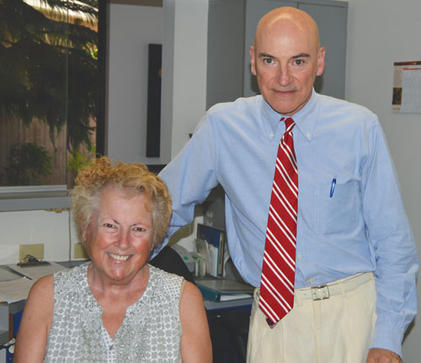The results of a new study called a “game-changer” by a Long Beach physician challenge the long-standing theory that cancer is a genetic disorder, revealing that lifestyle factors such as a poor diet, lack of exercise and over-consumption of alcohol and cigarettes play more of a factor in its development.

Dr. Robert Nagourney is the medical and laboratory director of Long Beach-based Nagourney Cancer Institute. He is the senior author of a recent study that shows poor lifestyle choices may influence development of cancer rather than genetics. He is pictured here with his former patient, lung cancer survivor Pat Merwin, who benefited from Dr. Nagourney’s individualized approach to treating the disease. (Photograph by the Business Journal’s Anne Artley)
“We’ve been told cancer is a disease of abnormal genes. I’m increasingly convinced that’s incorrect,” Dr. Robert Nagourney, the medical and laboratory director of Long Beach-based Nagourney Cancer Institute, said. Nagourney is the senior author of the study and a member of the MemorialCare Health System Physician Society.
The study, published August 3 in Oncotarget, a journal dedicated to cancer research, was an international collaboration among 17 institutions and 35 co-investigators. More than 1,200 patients were studied.
“We found in this study that you don’t ‘get’ cancer, you have it,” Nagourney said. “If you have a predisposition, it may manifest as you grow older if you eat badly, smoke cigarettes, or become obese. We’ve found that all diseases are related. You can go from normal towards a state of obesity, diabetes, cardiovascular disease, and ultimately, a state of cancer.” Nagourney described these diseases as a continuous condition.
The study examined the blood of more than 1,200 breast cancer patients through the process of mass spectrometry, a method that identifies minute quantities of sugars, amino acids and lipids in a patient’s bloodstream. Researchers examined almost 200 different chemicals in the bloodstreams of patients with cancer and compared their findings to individuals without the disease. “We began to find that there were different metabolic features that distinguished the cancers,” Nagourney said.
According to Nagourney, the study reveals that, rather than genetic mutations, cancer is caused by abnormalities in cell metabolism and energy. Nagourney described the study as a “game-changer” in the way the disease is treated. He explained that cells use altered metabolic pathways to survive if they do not have sufficient nutrients such as oxygen, sugars or proteins. “Cancer cells use normal genes abnormally,” he said. “They use anything at their disposal to stay alive. Cancer is a disease of cell survival, not a disease of cell growth or proliferation.”
“We think the future of cancer medicine will not be treatment, but prevention,” Nagourney said. “Instead of DNA-damaging radiation or chemotherapy, we will focus on metabolic changes to change your energy production within the cellular milieu. . . . there are things you can do in your 20s, 30s and 40s to prevent cancer in your 60s, 70s and 80s.”
Although he began the original work on this particular study about 10 years ago, Nagourney said the institute has focused on this type of work for approximately two decades. He said he would like to continue expanding the approach to individualized treatments. “The platforms we use enable us to measure these [metabolic] effects in tissue. So, when a patient comes to see me, we can figure out what drugs and combinations work best for every patient the day we meet them.”
According to Nagourney, additional studies are underway to apply the findings to other types of cancer.
